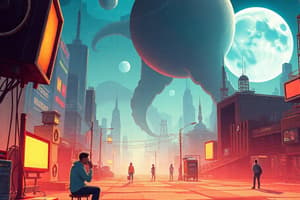Podcast
Questions and Answers
What major forces are mentioned in shaping the way we share information and connect with others?
What major forces are mentioned in shaping the way we share information and connect with others?
- Social networks like Facebook, Twitter, and Instagram (correct)
- Streaming services like Netflix, Hulu, and YouTube
- Interactive content like VR and AR
- AI and personalization technologies
What technology is driving the creation of increasingly intelligent systems for delivering personalized content?
What technology is driving the creation of increasingly intelligent systems for delivering personalized content?
- Blockchain-based platforms
- Artificial intelligence (AI) (correct)
- Virtual reality (VR)
- Transmedia storytelling
Which type of media is challenging traditional media structures by offering new possibilities for content creation and distribution?
Which type of media is challenging traditional media structures by offering new possibilities for content creation and distribution?
- Decentralized media (correct)
- Social media
- Interactive content
- Hybrid media
Which trend is expanding the boundaries of traditional media by offering immersive and interactive experiences?
Which trend is expanding the boundaries of traditional media by offering immersive and interactive experiences?
What presents a significant threat to the credibility of media as a source of truth according to the text?
What presents a significant threat to the credibility of media as a source of truth according to the text?
Which form of media marked the first electronic medium for mass communication?
Which form of media marked the first electronic medium for mass communication?
What was the powerful tool that Johannes Gutenberg invented for preserving and disseminating information?
What was the powerful tool that Johannes Gutenberg invented for preserving and disseminating information?
Which era saw the advent of computers and the World Wide Web?
Which era saw the advent of computers and the World Wide Web?
What media forms made publishing more accessible to the masses in history?
What media forms made publishing more accessible to the masses in history?
Which form of storytelling expanded the possibilities of visual media?
Which form of storytelling expanded the possibilities of visual media?
Flashcards are hidden until you start studying
Study Notes
Evolution of Media: Unraveling a Technological Timeline
Ever since humans first harnessed the power of communication, media has been a fundamental part of our lives, constantly evolving and adapting to the changing world. From cave paintings and ancient scrolls to the Internet and AI-driven content, this journey has been marked by both incredible innovation and momentous shifts. Let's embark on an entertaining and educational voyage, tracing the captivating evolution of media.
The Traditional Era
Oral Communication
Oral storytelling and word of mouth were the first media forms, with roots embedded in our prehistoric past.
Written Word
From ancient Egypt's papyrus scrolls to the invention of the printing press by Johannes Gutenberg, the written word became a powerful tool for preserving and disseminating information.
Print Media
Newspapers, books, and magazines made publishing more accessible to the masses, and news began to spread faster than ever before.
The Transitional Period
Radio and Television
Radio provided the first electronic medium for mass communication, while TV brought images into our homes.
Cinema
Motion pictures and cinema brought us new forms of storytelling, expanding the possibilities of visual media.
The Digital Age
Computers and the Internet
The advent of computers and the World Wide Web revolutionized the way we access and distribute information. The Internet has given rise to new media forms, such as websites, blogs, and podcasts.
Social Media
Social networks like Facebook, Twitter, and Instagram have become major forces in shaping the way we share information and connect with others.
Streaming Services
Services like Netflix, Hulu, and YouTube have transformed how we watch movies and television, offering on-demand content and personalized recommendations.
Current Trends and Future Prospects
AI and Personalization
Artificial intelligence is driving the creation of increasingly intelligent systems for delivering personalized content, such as recommendation engines and AI-generated news.
Interactive Content
Virtual reality (VR) and augmented reality (AR) are expanding the boundaries of traditional media, offering immersive and interactive experiences.
Hybrid Media
Hybrid media forms, such as transmedia storytelling and cross-platform narratives, are blurring the lines between traditional and digital media, allowing for more seamless and engaging experiences.
Decentralized Media
Decentralized media, such as blockchain-based platforms and decentralized applications (dApps), are challenging traditional media structures, offering new possibilities for content creation and distribution.
Challenges and Opportunities
The rapid pace of media evolution brings both challenges and opportunities. For example, the proliferation of fake news and misinformation presents a significant threat to the credibility of media as a source of truth. However, the ability to quickly and easily access accurate information also offers an opportunity to empower individuals and communities with knowledge.
As media continues to evolve and adapt, we can expect to see even more innovative forms of communication and storytelling unfold before our eyes, shaping the future of how we share information and connect with each other. Stay tuned to see what the next chapter of media evolution holds!
Studying That Suits You
Use AI to generate personalized quizzes and flashcards to suit your learning preferences.




